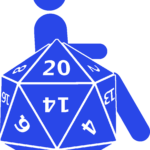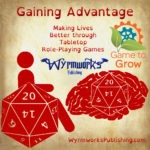Limitless Heroics for 5e (Disability, Neurodiversity, Mental illness Mechanics for DnD)
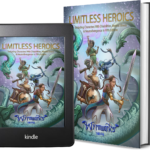
When you play a tabletop role-playing game like 5e, you want to be the hero. The world is different for you having been there, better. What if you could make the real world better by playing an RPG?! That’s what Limitless Heroics is all about. Limitless Heroics is the most comprehensive disability compendium ever created for a Tabletop Role-Playing Game. For Fifth Edition, it provides:
- 640 Pages of content!
- 450+ Traits: Game mechanics for nearly every condition or trait in existence (plus some fantasy traits, because that’s what you should expect in a world with magic) with 4 Impact Extents, and 6 Frequencies. With 1–6 traits per character (or more), that’s 64,800+ combinations with the option to add more. (Free Sample Trait: Blindness)
- 78 Random tables to choose or generate the traits, their Impact Extent, and their frequency (Get a free ashcan sample with all the tables from the book.)
- 200+ New Magic Items and an online random generator for thousands more! Nearly every trait includes mundane and magic assistive options. (Free Sample Assistive Magic Item: Braces of Blades)
- 4 New Monster Stat Blocks because sometimes, the disability or assistive device is a creature.
- 6 New Spells because sometimes, assistance comes from a spellbook
- Service animals designed as classes (similar to sidekicks)
- 50 Example NPCs, fully illustrated, ready to use
- A one-shot adventure
- Thousands of real world examples so players can learn more and better represent the traits
- Tutorials: Opening articles discuss how and why to implement these options, how to discuss it with your players, and common tropes to avoid. You have all the tools here to run an inclusive campaign.
Our website will have a free random generator to simplify determining character traits, but you’ll need the book for the descriptions and mechanics, or you can use the included tables to choose or roll manually.
We talked to dozens of people with diverse conditions to make sure our game mechanics represented their experiences before writing it, and over 900 people looked at the manuscript draft, and we got 90 pages of feedback from their experiences!
All writers, editors, and artists hired for this book are disabled, neurodivergent, and/or have mental or chronic illness.

Book Accessibility
- Dyslexia-friendly layout
- PDF, txt/csv, and ePub versions
- Fully screen reader accessible
- Indexed audio version included with every purchase
Real World Benefits
We believe that this resource will help you normalize disabilities in your life and the lives of other players. Non-disabled people can sometimes feel uncomfortable around disabled people or don’t know how to talk or act. This resource allows you to practice in an imaginary world to equip you with empathy and skills to feel increasingly comfortable doing that in the real world.And those with disabilities now have a way to represent their experience in-game to feel empowered and to help others see them more clearly.Imagine what we could communicate to the world when all those actual play Twitch streams include disabled characters!

This is a movement.
Limitless Heroics is more than an RPG book. It’s a petition. By supporting this project, you communicate to every game publisher on earth that disabled people exist and can easily be included in their games, that the customers want that representation, and that accessibility and representation are necessary core features for future products.Imagine companies and organizations seeing the success of this movement beyond the RPG community and how that would affect their decisions in the future. Imagine how you as RPG players who work in every industry can work for change to overcome ableism because of what you and your players learned while rolling dice at the RPG table.Imagining is what we do best, but we can use fantasy to change reality. Maybe RPGs have some real world magic after all. Support this project with the 2,287 backers and others who ordered it since, and mark this day on your calendar and social media as the day you helped change the world.
About the Players Edition
The Players Edition of Limitless Heroics includes everything in the full book except the adventure, magic items, and NPCs, reducing the size and associated costs by 346 pages. If you plan to use these resources in settings where you need multiple copies (e.g. schools, clinics, community organizations, etc.), this will save you some money.

We met these stretch goals, all of which are included.

$25,000: Complications & Prostheses
Once we hit the $25,000 goal, we added additional complications and magical prosthetics. Some experiences are not traits of various conditions, but complications that result from them, such as infections, concussions, secondary depression, and intoxication. Once we hit this goal, we added 20 complications to the book and 20 Magical Prostheses.

$30,000: 10 NPCs
Similar to our previously published Disabled NPC of the Week but with more details, our character team added 10 NPCs (Non-Player Characters) with full backgrounds, personality details, disabilities, and artwork to the book. These are in addition to the characters created for the Create a Character and DELUXE Create a Character rewards and add-ons, which will be included automatically.

$40,000: One-Shot Adventure: Horror of the Shade by Theo Kogod
When a caravan makes camp in the shadow of crumbling ruins, they awaken an ancient revenant and are transported to a dark eldritch dimension. To escape back to the physical world, they will need to fight their way past the undead shade or risk being trapped forever.

$50,000: Service Animals
We included a chapter to implement service animals into your game, both real world and fantasy animals, including rules for training and how to use them. This section is written by Brittney Hay with service animal trainer and user consultation.
Content Warning
This book contains descriptions and game mechanics for nearly every physical, mental, and emotional condition in existence and a few that don’t exist, including physical, mental, and emotional trauma and all manner of illnesses, including an entry on phobias and mention or illustrations of possible phobic triggers. If it can happen to your mind and/or body, it’s probably here. For those who would have difficulty with any of that, please be aware of that likelihood. Use the table of contents to avoid difficult sections, or give this book to a trusted friend, and let them comb through it for the details you need to build your character while skipping past the traumatic entries.
Creators

Dale Critchley (Owner, Wyrmworks Publishing) Primary author of Limitless Heroics, Dale Critchley is the owner, lead writer, and chief tea drinker at Wyrmworks Publishing. He’s been playing tabletop role-playing games since 1982 and launched Wyrmworks Publishing as a hobby in 2000 to share his homebrew resources with the world. In 2021, after seeing the power that a TTRPG group can have to change the lives of the participants for the better, he rededicated Wyrmworks Publishing to focus on using TTRPGs to intentionally improve the lives of others and turned a hobby into a full time pursuit.
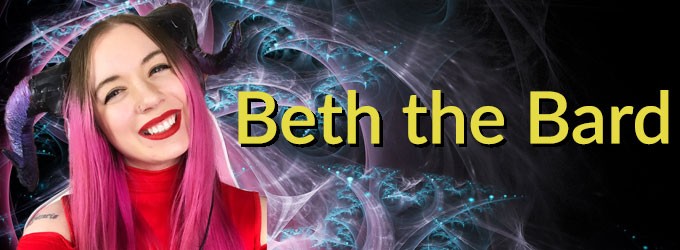
Beth the Bard, Layout Editor is the author of “She is the Ancient: A Genderbent Curse of Strahd” guidebook, now a Platinum best-seller on DMs Guild. She’s also a general TTRPG writer, graphic designer, and professional dungeon master.

Joie Martin, Cover Layout & Layout Contributor owns Drowning Moon Studios, a roleplaying game publisher that has produced over a dozen titles and two anthologies since being founded in 2017. They have been writing, developing, editing, and doing layout and graphic design for tabletop and live action roleplaying games since 1996. Beyond roleplaying games, Joie has produced content for a variety of markets, including ARGs, interactive theater, and immersive experiences. They have been a key speaker on panels about roleplaying game design at events such as DragonCon, MomoCon, and Metatopia, and was Head Judge for the 2020 IDGN Indie Groundbreaker Awards.

Naomi Hazlett: Copy Editor, Sensitivity ConsultantNaomi Hazlett, Bsc., MScOT, OT Reg. (Ont.) is a writer, editor, and occupational therapist with chronic pain. She is neurodiverse, queer, and lives with chronic pain and mental illness. Her work has most recently focused on social accountability, diversity, and inclusion in occupational therapy and gaming, including the adoption of a critical disability lens. Naomi has played and run TTRPGs for over 20 years; she has worked with organizations including Level Up Gaming, BALANCE for Blind Adults, and LOFT Community Services to run accessible TTRPGs, and consults for D&D Beyond. Naomi has multiple publications in academic journals, magazines, blogs, and poetry collections, and is currently the Managing Editor of the Canadian Association of Occupational Therapists’ national magazine, Occupational Therapy Now. She can be found online at @naomi_hazlett or can be reached via email.

Melissa Critchley, Sensitivity Consultant, lives with multiple disabilities. She has worked in the disability field for over 15 years and holds a graduate level certificate in Disability Policy and Services from the University of Minnesota in addition to her interdisciplinary master’s degree. She also recently completed an advanced certificate in Equity and Diversity and is an advocate for social justice and equitable societal change.Melissa has played quite a few tabletop RPG games through the decades which include Shadowrun, BESM, D20 Modern, Mutants and Masterminds, and Star Wars. However until we were confined to our homes during Covid quarantines, Melissa hated D&D. A good friend invited her to play over Discord, and despite her objections, convinced her that she “never had him as a DM.” It didn’t take long before she changed her mind about D&D, and it’s now her favorite game.

Simone Arnold, Sensitivity Consultant, Character Creation Team Simone Arnold MA, Certified Geek Therapist, is a neurodivergent, queer clinical mental health counselor in the state of Vermont. They have been working in the mental health field since 2013 across a variety of settings including as a crisis clinician and currently as a counselor at a designated agency. Through this they’ve had the opportunity to work with people across the disability spectrum. They are also establishing their own private practice that is queer friendly with a special focus on ADHD and Autism. Simone has been gaming since 2012 and has had the opportunity to play across an array of systems including D&D 5e, Pathfinder, Dread, Thirsty Sword Lesbians, Call of Cthulhu and more.

Matthew Rickmon, Sensitivity Consultant, Character Creation Team, Certified Therapeutic Game Master, owns Tabletop For Growth (IG, Twitter), a business dedicated to helping people learn interpersonal skills and develop core values through interactive tabletop games. Matthew has a Bachelor of Science in psychology and a Master of Divinity with a focus in pastoral counseling. He is a Certified Therapeutic Game Master and Certified Geek Specialist through Geek Therapeutics. He lives with multiple chronic illnesses: Crohn’s Disease, Irritable Bowel, and Psoriasis. He also strongly suspects he is neurodivergent. Matthew has been writing stories and running in-person and live-streamed tabletop roleplaying games from his home in California since 2019. Beyond running roleplaying games, he maintains a strong partnership with The Erika Legacy Foundation, a mental health awareness and suicide prevention non-profit in Canada. Painting and writing tend to take up his free time when he’s not being yelled at by his cat, Mr. Fox, for more pets.
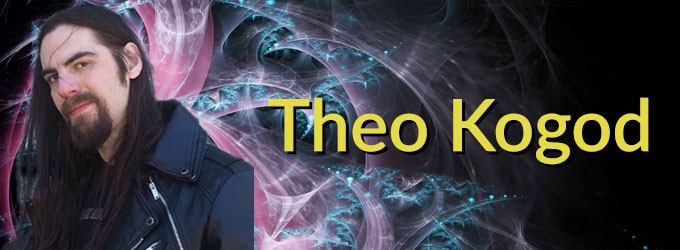
Theo Kogod is a genderfluid writer, editor, educator, and activist. Diagnosed with dyslexia and ADHD, Theo learned to read at the age of ten, then attempted writing their first novel a year later. They have written for numerous publications, including the websites CBR, Screen Rant, The Gamer, and The Comics Vault, as well as the podcast Enter the Fanboy. In 2014, Theo helped found the magazine 3 Feet Left as its Resident Writer. Their fiction has been published in Diabolical Plots, Starward Shadows, and the cli-fi anthology A Flash of Silver Green: Stories of the Nature of Cities 2099, among other places. They are a lifelong storyteller and nerd who has been running D&D and other tabletop RPGs for over 15 years. You can find them at @TKogod.

Brittney Hay is a non-binary ENNIE-nominated bestselling TTRPG writer and creator. They are a full-time geeky nerd mom who enjoys reading, cooking and all things nerdy.
Amy Weisner
Amy Weisner is a second year occupational therapy student at the University of Toronto. She has been playing TTRPGs for the past five years, including D&D 5e, Call of Cthulhu, and most recently the Avatar TTRPG. She has a degree in Child and Youth Care, and has worked in many settings and roles including community outreach and within the school systems. Through her experience, she has worked with individuals from all walks of life, including people from across the spectrum of disability and mental health. Amy is a passionate advocate, with experience presenting on social justice issues and advocating for clients. She has most recently begun a fieldwork placement with OT Naomi Hazlett at Level Up Gaming, assisting with running therapeutic TTRPGs for neurodiverse young adults and working on projects to make TTRPGs more accessible.
Artists
We intentionally assembled an eclectic team of artists to reflect the diversity of experiences and expressions of these conditions:

Kalman Andrasofszky (Insta) is a freelance illustrator, comic book artist, writer, and educator in Toronto, a longtime member of the R.A.I.D. Studio, and newly diagnosed with ADHD. In 20+ years as a creative professional, Kalman has worked with many clients such as Marvel Entertainment, DC Comics, Wizards of the Coast, Shaftesbury Films, UNESCO, Portfolio Entertainment, and TekSavvy, among others, creating content for such brands as X-Men, Avengers, Batman, Star Wars, Dungeons & Dragons, Murdoch Mysteries, and PG: Psycho Goreman. Kalman reinvigorated the classic Canadian superhero property Captain Canuck by both rebooting and adding many new concepts and characters to significantly expand the scope of the brand into a dynamic sci-fi shared universe. When not writing and drawing too many things at once, Kalman can be found retro-gaming on his vintage SEGA Genesis system.
Additional Artists
- Dana Braga (Cover Artist)
- ArtificialJealousy
- Dot Valledor
- Erin Z. Anderson
- Four-Horns
- Hekellion
- Jason Sherlin
- Joseph Bielenberg
- Lucy Smart
- Luca Ippoliti (IG)
- Pepoq
Additional Sensitivity Consultants
In addition to our primary sensitivity consultants, we discussed traits and game mechanics with hundreds of others as part of the research for this book to reflect their lived experiences as closely as possible. That list is too long to include here, but many of their names are included in the book’s credits, and we can’t express enough how grateful we are for their help.
Press
We appreciate all who have helped us get the word out about this project on podcasts and in the press.
- It’s a Mimic
- Crit Academy
- Geek Native (and again)
- Dicebreaker
- Nerd Immersion
- ComicBook.com
- Sly Flourish
- Disabled&Dragons (Interview)
- EN World
- Tabletop Journeys Podcast (Interview)
- Nerdarchy Daily Live Chat (Interview)
- Tabletop Gaming News
[mc4wp_form id=”1466″]
Geet weekly updates, encouragement, discounts, and free gifts!
